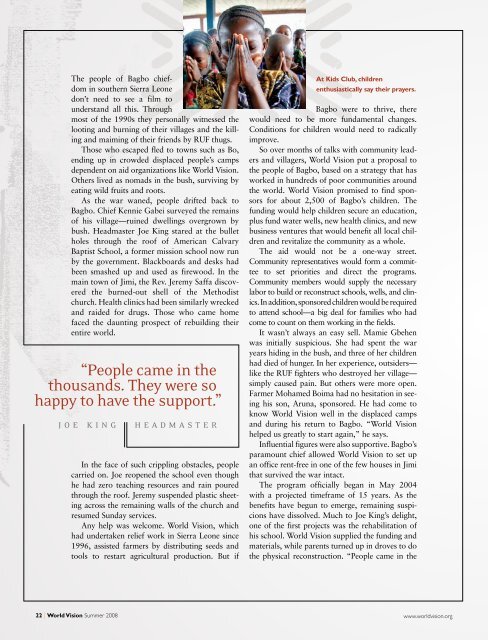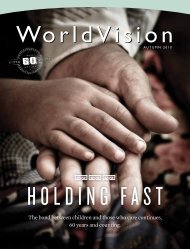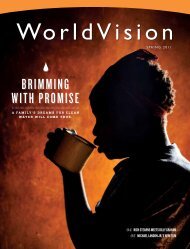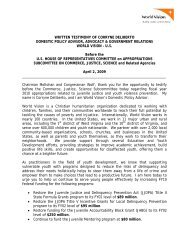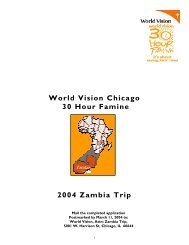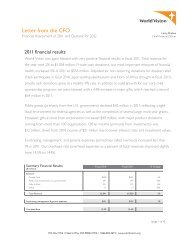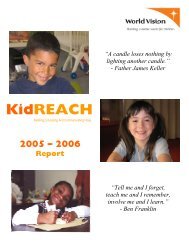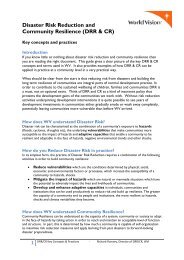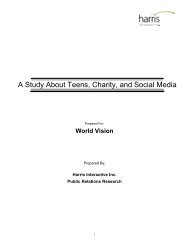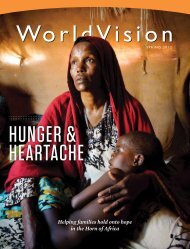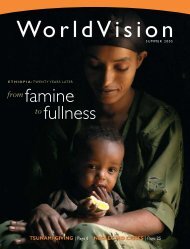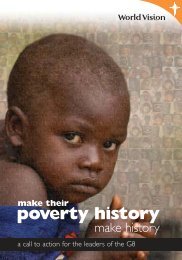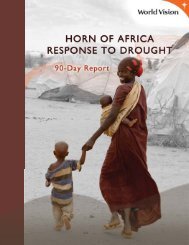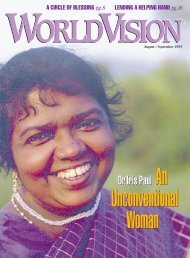Summer 2008: Inside a Sponsorship Community - World Vision
Summer 2008: Inside a Sponsorship Community - World Vision
Summer 2008: Inside a Sponsorship Community - World Vision
You also want an ePaper? Increase the reach of your titles
YUMPU automatically turns print PDFs into web optimized ePapers that Google loves.
The people of Bagbo chiefdom<br />
in southern Sierra Leone<br />
don’t need to see a film to<br />
understand all this. Through<br />
most of the 1990s they personally witnessed the<br />
looting and burning of their villages and the killing<br />
and maiming of their friends by RUF thugs.<br />
Those who escaped fled to towns such as Bo,<br />
ending up in crowded displaced people’s camps<br />
dependent on aid organizations like <strong>World</strong> <strong>Vision</strong>.<br />
Others lived as nomads in the bush, surviving by<br />
eating wild fruits and roots.<br />
As the war waned, people drifted back to<br />
Bagbo. Chief Kennie Gabei surveyed the remains<br />
of his village—ruined dwellings overgrown by<br />
bush. Headmaster Joe King stared at the bullet<br />
holes through the roof of American Calvary<br />
Baptist School, a former mission school now run<br />
by the government. Blackboards and desks had<br />
been smashed up and used as firewood. In the<br />
main town of Jimi, the Rev. Jeremy Saffa discovered<br />
the burned-out shell of the Methodist<br />
church. Health clinics had been similarly wrecked<br />
and raided for drugs. Those who came home<br />
faced the daunting prospect of rebuilding their<br />
entire world.<br />
“People came in the<br />
thousands. They were so<br />
happy to have the support.”<br />
j o e k i n g<br />
h e a d m a s t e r<br />
In the face of such crippling obstacles, people<br />
carried on. Joe reopened the school even though<br />
he had zero teaching resources and rain poured<br />
through the roof. Jeremy suspended plastic sheeting<br />
across the remaining walls of the church and<br />
resumed Sunday services.<br />
Any help was welcome. <strong>World</strong> <strong>Vision</strong>, which<br />
had undertaken relief work in Sierra Leone since<br />
1996, assisted farmers by distributing seeds and<br />
tools to restart agricultural production. But if<br />
At Kids Club, children<br />
enthusiastically say their prayers.<br />
Bagbo were to thrive, there<br />
would need to be more fundamental changes.<br />
Conditions for children would need to radically<br />
improve.<br />
So over months of talks with community leaders<br />
and villagers, <strong>World</strong> <strong>Vision</strong> put a proposal to<br />
the people of Bagbo, based on a strategy that has<br />
worked in hundreds of poor communities around<br />
the world. <strong>World</strong> <strong>Vision</strong> promised to find sponsors<br />
for about 2,500 of Bagbo’s children. The<br />
funding would help children secure an education,<br />
plus fund water wells, new health clinics, and new<br />
business ventures that would benefit all local children<br />
and revitalize the community as a whole.<br />
The aid would not be a one-way street.<br />
<strong>Community</strong> representatives would form a committee<br />
to set priorities and direct the programs.<br />
<strong>Community</strong> members would supply the necessary<br />
labor to build or reconstruct schools, wells, and clinics.<br />
In addition, sponsored children would be required<br />
to attend school—a big deal for families who had<br />
come to count on them working in the fields.<br />
It wasn’t always an easy sell. Mamie Gbehen<br />
was initially suspicious. She had spent the war<br />
years hiding in the bush, and three of her children<br />
had died of hunger. In her experience, outsiders—<br />
like the RUF fighters who destroyed her village—<br />
simply caused pain. But others were more open.<br />
Farmer Mohamed Boima had no hesitation in seeing<br />
his son, Aruna, sponsored. He had come to<br />
know <strong>World</strong> <strong>Vision</strong> well in the displaced camps<br />
and during his return to Bagbo. “<strong>World</strong> <strong>Vision</strong><br />
helped us greatly to start again,” he says.<br />
Influential figures were also supportive. Bagbo’s<br />
paramount chief allowed <strong>World</strong> <strong>Vision</strong> to set up<br />
an office rent-free in one of the few houses in Jimi<br />
that survived the war intact.<br />
The program officially began in May 2004<br />
with a projected timeframe of 15 years. As the<br />
benefits have begun to emerge, remaining suspicions<br />
have dissolved. Much to Joe King’s delight,<br />
one of the first projects was the rehabilitation of<br />
his school. <strong>World</strong> <strong>Vision</strong> supplied the funding and<br />
materials, while parents turned up in droves to do<br />
the physical reconstruction. “People came in the<br />
22 | <strong>World</strong> <strong>Vision</strong> <strong>Summer</strong> <strong>2008</strong><br />
www.worldvision.org


